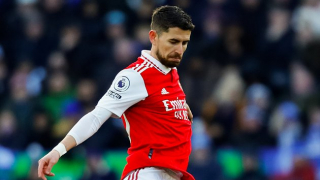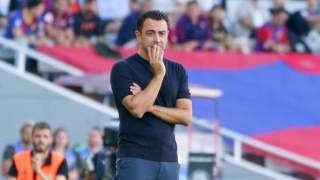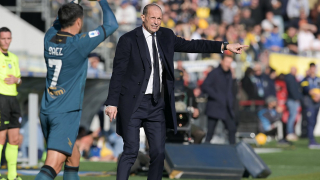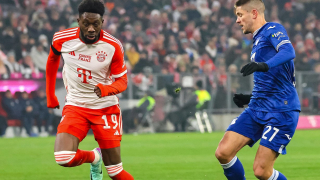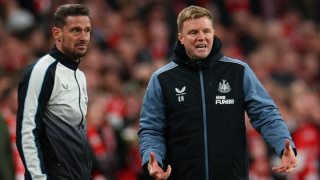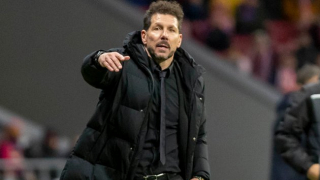It was a bizarre, breathless final 20 minutes at Wembley that had all the hallmarks of a classic derby match: poor refereeing, countless fouls, chaotic tactics, and a red card. And yet before this frantic end the North London Derby had followed a coherent structure, Spurs holding the majority of possession (but unable to find fluency through the centre) and Arsenal waiting for counter-attacking opportunities.
Spurs' inability to play with speed or coherence in central midfield meant they predominantly attacked via long passes into the wing-backs or hit-and-hope long balls towards the forwards. Without Dele Alli to run in behind neither attempt worked – leading to a dramatic change of tack from the Spurs manager with 20 minutes to go. Mauricio Pochettino's bold tactical changes in the second half caused late mayhem, almost handing Arsenal what would have been a crucial three points in the race for the top four.
Here are six tactical talking points from Tottenham 1-1 Arsenal:
1) Emery wins tactical battle with deep full-backs and pressing in bursts
Perhaps the most important aspect of Unai Emery's surprise 4-2-3-1 formation at Wembley was his unusual instructions to both full-backs to stay in line with the centre-backs at all times. Nacho Monreal and Shkodran Mustafi never ventured forward, which ensured the Tottenham wing-backs – so important in Pochettino's narrow 3-4-1-2 – could not find space in the final third.
Mustafi had Danny Rose in his pocket, and while Kieran Trippier grew in influence he could not get Harry Kane or Heung-Min Son in behind the defence. Spurs' disappearing central midfield didn't help matters, with Rose rarely finding close support from a fellow Tottenham player when forced to square up to Mustafi. Matteo Guendouzi was excellent in the first half (and Lucas Torreira effective in the second) at shimmying across to cover his right-back.
The Gunners full-backs playing so deep would not have worked had Arsenal pressed as high as usual, but instead Emery dropped off to invite Spurs onto them before hitting on the counter. They pressed in bursts, notably when the ball was played back to Hugo Lloris; Tottenham's recent errors meant it made sense to apply the press when Spurs had the ball in their own third, only to drop back into shape once the ball was in the central third of the pitch.
2) Wanyama and Sissoko create a lifeless midfield, suggesting Poch shouldn't have used a back three
Victor Wanyama failed to make a single defensive action in the match, reflecting his ghostly performance in central midfield alongside Moussa Sissoko. Wanyama doesn't have the technical quality to distribute quickly and effectively, meaning he was frequently bypassed altogether, while Sissoko charges manically into the channels – leaving Wanyama all alone. The result was a total absence of control through the centre, ensuring Spurs' build-up play was rigid and forcing their defenders to play long balls forward.
Pochettino should have started with two centre-backs, rather than three, because their shape meant Spurs had a numerical disadvantage in the middle. What's more, the opening goal came via a mix-up in defence as two of the three Spurs centre-backs pushed beyond the halfway line; it was desperation to add numbers to midfield that indirectly led to the opening goal.
3) Eriksen struggles to get into the game as Spurs launch long, Alli-seeking passes
The flatness of Wanyama and Sissoko meant Spurs frequently tried to punt long balls up for Kane in the hope of winning the second ball as it dropped, or they tried long diagonal passes out to Trippier and Rose. Both tactics largely failed, and yet it could have worked - had Christian Eriksen played in the right manner.
Tottenham's best chances came when Eriksen made Dele Alli-like runs in behind, making himself available for clipped passes over the top of the defence. Heung-Min Son and Harry Kane, pulling the Arsenal centre-backs about, created room for through balls; if only Alli had been on the pitch to make the right runs Tottenham could have won. Eriksen struggled to get into the game, his number ten space having been squeezed out by the Arsenal midfield and neither Wanyama nor Sissoko offering adequate support.
4) Iwobi & Ramsey lead counters as Arsenal attempt to capitalise on Spurs' disorganisation
Arsenal's primary strategy in this match was to counter-attack down the left flank, absorbing Spurs' pressure via out-battling them in midfield before releasing Alex Iwobi, Aaron Ramsey, and Alexandre Lacazette. It almost worked on several occasions in the first half, although ultimately their chances were few and far between.
The goal was a counter – albeit a series of errors from Spurs – and the penalty that should have won the game came via a quick breakaway. Henrikh Mkhitaryan, looking sharper and more confident than at any other point during his time in England, rolled Trippier and put substitute Pierre-Emerick Aubameyang through on goal before he was clipped in the box by Davinson Sanchez.
5) From Eriksen in the holding role to a 4-2-4 with Rose in midfield, Pochettino's bold changes almost cost Spurs the game
The previous four points related to the measured tactical battle of the first 70 minutes at Wembley. After that: carnage.
Pochettino's first gamble was replacing Wanyama with Erik Lamela and moving Eriksen into a deeper midfield position, a move that within two minutes showed the positives and negatives of playing the Dane in a withdrawn role. Presumably the switch was to help get Eriksen on the ball (as previously mentioned, Arsenal's narrow shape meant there was no room in the number ten space), and immediately it was Eriksen's smart header that set Lamela away for a rare Spurs chance. But moments later, Granit Xhaka effortlessly glided past Eriksen and through the Spurs midfield to provide Aubameyang with a decent opening.
Unsurprisingly, Pochettino took Eriksen out of the position ten minutes later – plonking Danny Rose in an unfamiliar role. The outcome was predictably shambolic, not least because Spurs were now in a maddeningly open 4-2-4 formation. Arsenal's won their penalty because of Tottenham's wide-open, gung-ho attacking shape. Pochettino produced the sort of chaos we are used to seeing from Emery, creating a panicky final 20 minutes full of desperate lunges – and 16 fouls.
6) Rose lifts the crowd with a wildly erratic performance
In the first half Tottenham rose the tempo, and put Arsenal under pressure, only after Danny Rose flew into a heavy slide tackle to pump up the crowd. Rose was again the instigator in the second period, this time because Pochettino played him so remarkably out of position.
Rose didn't know where to stand or what to do, but you cannot fault him for effort. At times weaving through the middle to break the lines like a world-class box-to-box midfielder, and at others passing sloppily straight to the opposition, he fired up the crowd and contributed significantly to the chaos towards the end of the contest. Another crunching tackle late on, following by a fist-pump at the crowd, helped create such an intense final 15 minutes of the game.

